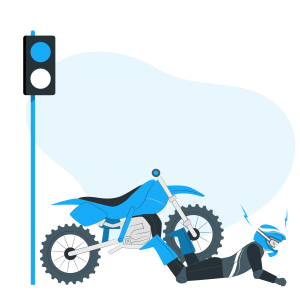9 Common Mistakes to Avoid After a Motorcycle Accident
Motorcycle accidents can be traumatic, leaving riders facing physical injuries, financial burdens, and legal complexities. Making critical mistakes in the aftermath of a crash can significantly impact your recovery and your ability to receive the compensation you deserve.
This guide will help you avoid these pitfalls by highlighting common errors riders often make after an accident. It will cover crucial aspects such as gathering evidence, dealing with insurance companies, protecting your legal rights, and empowering you to navigate the recovery process effectively and get back on the road.
1. Signing Documents Without Legal Counsel
After an accident, you may feel pressured to quickly resolve the situation, especially if an insurance adjuster presents you with documents to sign. However, signing agreements, waivers, or settlements without fully understanding their implications can have serious consequences. Seeking help from a motorcycle accident lawyer in Orange County or wherever you’re located ensures you have expert guidance to navigate these challenges, review the terms, and advocate for the compensation you deserve.
2. Not Calling Emergency Services Immediately
One of the most critical mistakes people make after a motorcycle accident is failing to call emergency services immediately. Regardless of how minor the accident might seem, contacting 911 is essential for several reasons. First, it ensures that medical professionals are dispatched to assess motorcycle accident injuries, which may not be immediately visible or felt due to adrenaline. Second, law enforcement can document the accident scene and create an official report, often crucial for insurance claims or legal actions.
3. Leaving the Scene Prematurely
Leaving the scene of an accident before exchanging information or ensuring everyone’s safety is irresponsible and potentially illegal. Depending on the jurisdiction, leaving without notifying law enforcement or helping could lead to hit-and-run charges, even if the accident wasn’t your fault. Remaining at the scene allows you to cooperate with law enforcement, gather necessary information, and demonstrate responsibility. The only exception should be if you require immediate medical attention, in which case you should contact emergency services and inform them of your departure.

4. Failing to Document the Accident
Proper documentation of the accident scene is vital but often overlooked in the chaos following a crash. Taking photos of the damaged vehicles, the road conditions, traffic signs, and any visible injuries can provide invaluable evidence for your case. Skid marks, debris, and weather conditions can all be key factors in determining fault. Additionally, gathering witness contact information and statements can further strengthen your position.

5. Admitting Fault or Apologizing
It’s natural to want to express concern or apologize after an accident, but doing so can be interpreted as an admission of guilt. Even statements such as ‘I didn’t see you’ or ‘I’m sorry’ can be used against you in insurance claims or legal proceedings. Sticking to factual statements when speaking to law enforcement or other parties involved is best. Let the authorities determine fault based on collected evidence rather than inadvertently weakening your position with unnecessary admissions.
6. Not Seeking Medical Attention
Skipping a medical evaluation after a motorcycle accident can be a grave mistake. While some minor injuries are immediately apparent, others, like internal bleeding, concussions, or soft tissue damage, may not show symptoms until hours or days later. By not seeking medical attention, you risk worsening your internal injuries and undermining any future claims for medical expenses. Insurance companies often argue that a delay in treatment indicates that injuries were not severe or caused by the accident, which could result in reduced compensation.
7. Neglecting to Notify Your Insurance Company
Notifying your insurance provider about the accident promptly can create complications later. Most insurance policies have strict timelines for reporting accidents, which could result in claim denial. When informing your insurer, provide accurate and factual details without speculating about fault or admitting liability. Delays or inaccuracies in reporting could harm your ability to recover damages or defend against claims made by other parties.
8. Posting About the Accident on Social Media
Nowadays, many people share life events on social media without considering the consequences. Posting photos, details, or updates about your accident can harm your case. Opposing parties, including insurance companies or defense attorneys, may use your posts to contradict your claims or minimize their liability. For example, a post about feeling fine could be interpreted as evidence that your injuries are not serious. To safeguard your case, avoiding discussing the accident online is best.
9. Delaying the Filing of a Claim or Lawsuit
Procrastination can be a costly mistake after a motorcycle accident. There are strict deadlines, known as statutes of limitations, for filing personal injury claims, which vary by jurisdiction. Missing these deadlines could result in forfeiting your right to compensation entirely. Additionally, evidence becomes more challenging to gather as time passes, and witness memories may fade. Acting promptly to file claims or lawsuits not only preserves your legal rights but also strengthens your case by ensuring the availability of fresh evidence and testimony.
Conclusion
Remember, your safety and well-being are paramount. By taking proactive steps and making informed decisions, you can navigate the challenges of a motorcycle accident with greater confidence and ensure a smoother recovery. This guide provides a starting point, but remember to consult with legal and medical professionals to address your specific needs and circumstances.
Author Bio:
Jeffrey Easton is a passionate legal writer with years of experience specializing in personal injury law and motorcycle accident cases. Dedicated to empowering accident victims with practical advice and actionable insights, Jeffrey collaborates closely with top attorneys to provide accurate and helpful content. When not writing, he enjoys exploring scenic bike routes and advocating for road safety initiatives. Their goal is to ensure every motorcyclist understands their rights and options after an accident.